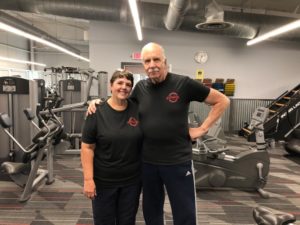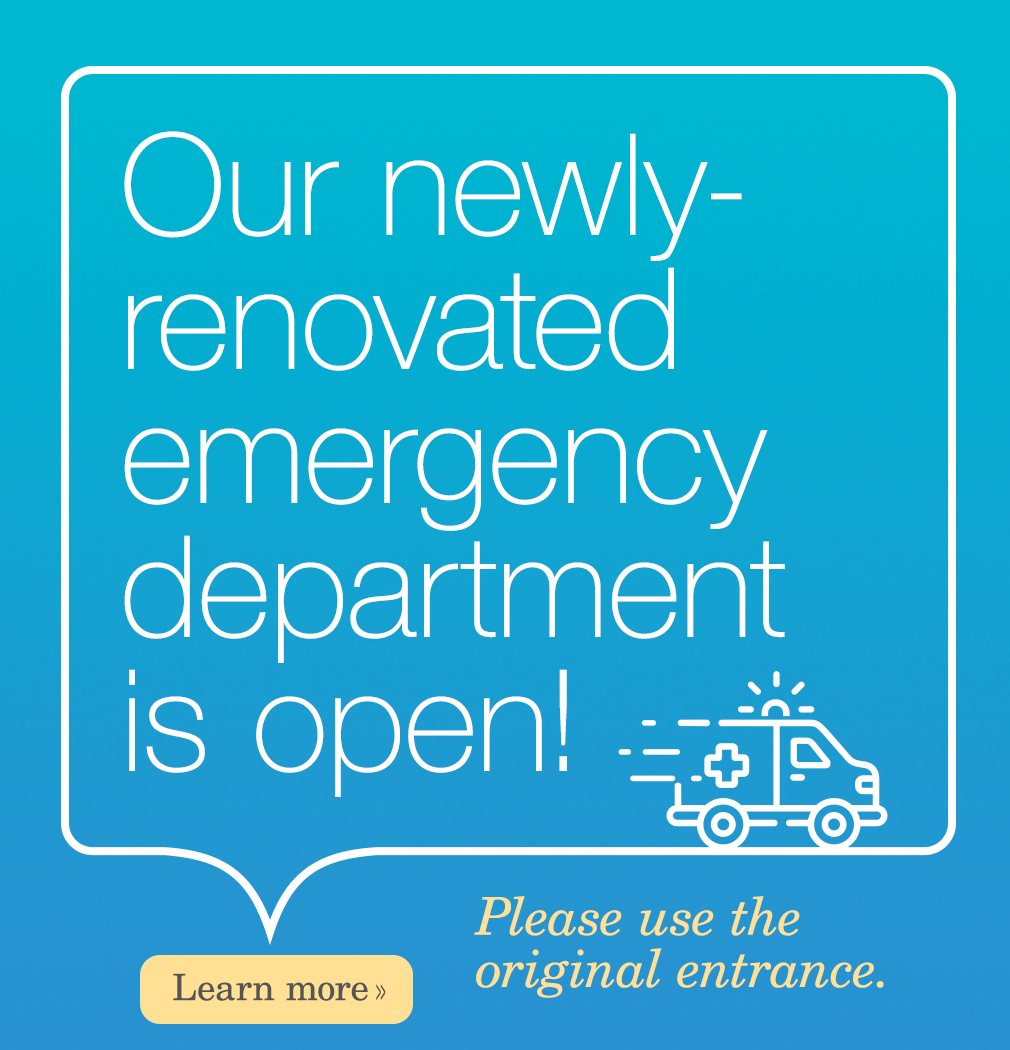

Cardiac Rehab Patients Benefit from Renewed Certification
By: Sarah Parsons West, for NMC
St. Albans – NMC’s Cardiac Rehabilitation program continues to proactively serve patients, attaining renewed certification through the American Association of Cardiovascular and Pulmonary Rehabilitation (AACVPR).
“The AACVPR is dedicated to improving the quality of life for patients and their families, while committing to the continued professional development of members through networking and educational opportunities,” says Kristy Cushing, PT, Rehab Services Manager at NMC.

Steven Vittum and significant other Diane Chaffee take a break during one of their workouts at The Fitness Zone, St. Albans. Vittum underwent open-heart-surgery in 2019, and successfully completed 36-sessions of Cardiac Rehabilitation at NMC. Vittum and Chaffee exercise together three times a week, to continue the routines he learned during rehab. Photo Courtesy: Steven Vittum
“Healthcare is all about assuring that patients are getting the best most up-to-date care,” she says, “and NMC being AACVPR certified validates our commitment to the mission of providing exceptional care.”
The AACVPR accreditation process reviews facilities for adherence to standards and guidelines, while promoting preparedness measures and medical emergency protocols for nine commonly seen Cardiac Rehab clinical situations that could lead to a life-threatening medical emergency.
“The protocols are best practice guidelines on how to handle these situations step-by-step,” Cushing says, which are Angina (chest pain), Hypertension or Hypotension (high or low blood pressure), Hyperglycemia or Hypoglycemia (high or low blood sugar level), Tachycardiac or Bradycardia (rapid or low heart rate), Acute Dyspnea (shortness of breath) and lastly, Cardiopulmonary Arrest.
The certification requirements not only focus on clinical competency for staff but measure percentage-based outcomes for each patient. “Cardiac Rehab offers patients highly individualized treatment plans that include exercise, nutrition, support and individual risk management,” says Cushing.
“My quality of life is now better than it was two years ago,” says Steven Vittum, 76, a Cardiac Rehab patient who completed the program last year. “I seriously doubt I would have had a successful recovery without the cardio program at NMC. They not only gave me the motivation to recover but to continue exercising and maintain the healthiest lifestyle possible.”
Vittum was diagnosed with cardiac arrhythmia, a condition in which electrical impulses in the heart are irregular; and atrial fibrillation (a-fib), another cause for an irregular and often rapid heart rate that commonly causes poor blood flow, due to the heart’s upper chambers (atria) beating out of coordination with the lower chambers (ventricles).
Constantly winded at the time, his Cardiologist warned that it would only get worse. The valve between the left atrium and the left ventricle of his heart needed to be replaced. On March 4 of 2019 Steven Vittum underwent Open Heart Surgery for a Mitral Valve replacement at the UVM Medical Center.
Upon waking from surgery, he was told that he would eventually need a pacemaker to regulate his heart’s rhythm. He says, “I asked if they could just do it now since I am already here.” Obligingly, his pacemaker was implanted the following day.
“After open-heart surgery and installation of a pacemaker, I returned home limited to short walks around the house and lifting no more than ten pounds. For several weeks even showering or getting in and out of bed was a chore,” he says.
Quality of Life
That April, Vittum entered the Cardio Rehab program at NMC, and for the next 12 weeks would exercise under supervision, three times a week. “At each session I wore a portable cardiac monitor and was monitored by the staff,” Vittum recalls.
“A large component of the program is helping and encouraging the patients to be more active and teaching them about achieving optimal blood pressure control,” says Katy Magnuson, RN, the designated Cardiac Rehab nurse at NMC. “My job is to help participants understand their individual risk factors and work together on a plan to manage these.”
In addition to Magnuson, the Cardiac Rehab team is comprised of two Athletic Trainers (ATC, one of whom is a wellness coach) and a Registered Dietician (RD), allowing for tailored plans to meet patient’s needs.
“Our Registered Dietician will literally do food demonstrations, including how to limit cooking with salt and understanding portion control,” explains Cushing. “Truly, all Cardiac Rehab treatment plans have four components: exercise, nutrition, psychosocial and comorbidities,” each contributing to a beneficial outcome.
“I feel that our AACVPR certification leads our team in evidence-based, best-practice guidelines. It drives us to focus on high quality outcomes that improve a patient’s quality of life,” Magnuson agrees.
“Katy especially was very good at monitoring my workouts,” says Vittum, “Checking both the rhythm monitors and making sure I stayed hydrated, ensuring I always had water to drink.”
Assisting patients in understanding the psychological impact that having a cardiac event can have, and finding ways to cope, Magnuson says, helps to improve their mental and emotional health.
“One should be prepared for the physical discomfort, as well as the psychological discomfort,” Vittum agrees. “Frustration and periods of depression are not uncommon. Those emotions will pass sooner than later, they are simply a part of the process.”
Vittum says that he could feel his strength returning during each session, and just how good it felt those first few times as his stamina built. “Soon I was walking for 20 minutes, and more, on the treadmill and doing other exercises I was unable to do even before surgery. I can now climb a set of stairs without having to catch my breath and do everyday chores with ease.”
Due to the COVID-19 pandemic current rehab sessions are capped at six patients to maintain social distancing, while pre-COVID they allowed ten patients per session.
“Presently there are ten patients enrolled with new intakes weekly. Patients participate in 30-to-60-minute sessions, three times per week, which consist of exercise and group education classes,” says Magnuson.
“Mr. Vittum made tremendous progress and gains while in the program,” she says. “During his first session with us he set personal goals and was bound and determined to achieve them, which he did. He knew the importance of continuing to exercise following discharge and is still exercising three times a week.”
After completing the Cardiac Rehab program in July 2019, Vittum joined the Fitness Zone in St. Albans to continue year-round exercise routines. “You just can’t rely on the weather during the winter to allow outdoor activity.”
Vittum says he would have happily continued at the NMC gym if he had been allowed to, “I cannot praise the NMC rehab people enough. Their positive attitudes motivated me to improve.”
“The best part of my job by far is the satisfaction of having patients trust me with their care and seeing their progress – not only physically, but mentally and emotionally as well,” says Magnuson.
“Be patient with yourself and follow the advice of others. Remember, you’re not alone,” Steven Vittum says, offering a little advice of his own to those experiencing medical setbacks or facing rehabilitation.
“Let your friends and neighbors help,” he says, “they really want to be part of your rehabilitation and helping you makes them feel good; they are showing you how much they care.” —

